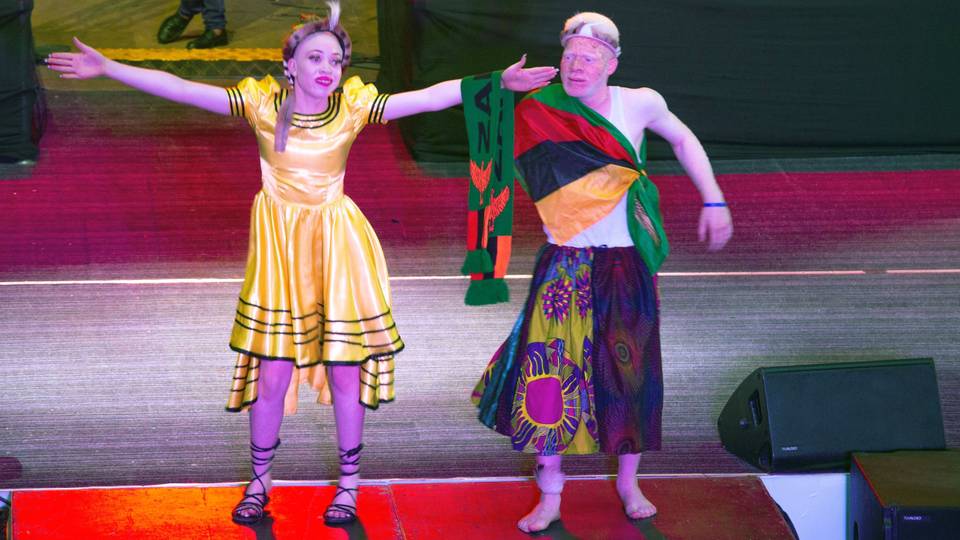Sport
Dollar
42,8139
0.19 %Euro
50,2685
0.14 %Gram Gold
5.958,0200
0.04 %Quarter Gold
9.852,9100
0.24 %Silver
90,6300
0.82 %Data shows that one in every 5,000 people in Sub-Saharan Africa live with albinism

By Mazhun Idris
Frowned upon practices against people with albinism have been associated with some societies, especially in Africa.
However, the story of Muse Brothers is rarely told.
George and Willie Muse were African-Americans living with albinism.
They were kidnapped as boys in Truevine, Virginia in 1899, and were used for circus displays until 1927.
Present at birth
The brothers, who endured demeaning nicknames, were paraded and exploited for money.
This is the stigma that has existed for years against people with albinism.
Albinism comes from the Latin word "albus" to mean "white."
The condition is hereditary, meaning it is present at birth. Albinism is as a result of decreased or absence of melanin in the skin, hair and eyes.

Vulnerable
This leaves people with albinism vulnerable to the harsh effects of the sun.
Data shows that one in every 5,000 people in Sub-Saharan Africa live with albinism. The United Nations says that one in 20,000 people in Europe and North America have the condition.
Donald Tampi Bagas is a Nigerian national who was born with albinism. Living with the condition was "not much of an issue" for him, except for low vision during the day, and occasional stigma.
He was born and raised in central Nigeria's state of Nasarawa. His parents supported him throughout his childhood in the late 1980s and 1990s.
Bright light
The 35-year-old overcame stigma associated with albinism. Today, he works in the capital Abuja for an organisation that seeks to empower people living with disabilities.
In Zimbabwe, one in every 1,000 people live with albinism, while in Tanzania, one in every 1,400 people live with the condition.
In South Africa, one in every 3,900 people of colour live with albinism.
Almost all people with the condition have visual problems, as bright light severely affects them.
Physical activities
"The sun's bright rays leave me uncomfortable. There is nothing I can do to change the situation, and I have learnt to live with it," Nigeria's Bagas tells TRT Afrika.
"During childhood, I disliked student assemblies because the sun would affect my vision."
The visual challenges also affected his physical activities as a child, including playing football.
"I could not see far-off objects. This forced me to occupy the front row seats in the classroom," he recounts.
Awareness
Bagas says the stigma associated with albinism prompted him to join TAF Africa, a non-profit organisation that raises awareness about albinism, and seeks their inclusion in positions of decision-making.
In some countries, a majority of people with albinism die from skin cancer between 30 and 40 years of age, the United Nations says.
TAF Africa has helped Nigeria come up with policies that promote the rights of people with albinism.
"In their daily activities, people living with albinism are exposed to the sun. Some of them do not know what to do to protect themselves against the scorching rays. We need to educate them on how to protect their health," Bagas says.
Society 'needs sensitisation'
He adds that the larger society also needs to be sensitsed on how to fairly treat people with albinism.
The United Nations says discrimination of people living with albinism has no place in the society.
In some communities, people with albinism are subjected to physical and emotional violence, and even ritual killings.
Jake Epelle, the chief executive officer of TAF Africa, commended Nigeria's electoral commission for providing 20,000 magnifying glasses in the 2023 elections to help people with visual problems, including those living with albinism.
'Practical changes'
The World Albinism Day is marked on June 13 of every year.
The UN says practical changes in the society are still required to ensure full and equal enjoyment of rights by people living with albinism.
➤ Click here to follow our WhatsApp channel for more stories.
Comments
No comments Yet




















Comment